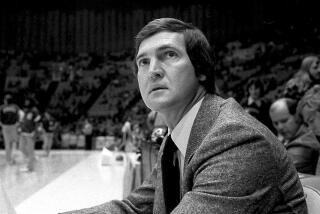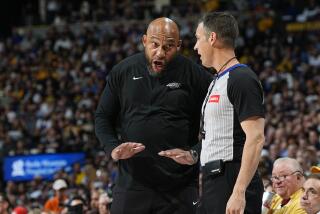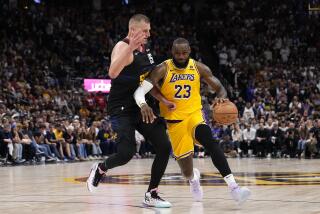Out of Options, Lakers Cash In With Scott’s Shot : Pro basketball: At the buzzer in overtime, L.A. guard makes a three-point basket to defeat the Spurs, 115-114.
SAN ANTONIO — Told by his coach merely to “float,” basically a euphemism for staying out of the way, Laker guard Byron Scott naturally gravitated to his favorite spot beyond the three-point line and waited for his teammates to take notice.
There were only 7.7 seconds left in overtime, and the Lakers trailed the San Antonio Spurs by two points. The options, as prescribed by Coach Pat Riley, did not include Scott. But as play unfolded, Magic Johnson was double-teamed, James Worthy was covered and Orlando Woolridge found himself stuck in the lane with the ball.
Time dwindled. Going nowhere--nowhere to go, really--Woolridge finally noticed Scott alone on the left wing. Scott received Woolridge’s cross-court pass with two seconds left, took stock of his positioning, then swished a three-point shot at the buzzer for a 115-114 Laker victory over the Spurs.
The victory improved the Lakers’ record to 38-12 and maintained their 1 1/2-game lead over the Portland Trail Blazers in the Pacific Division.
It came despite impressive performances by the Spurs’ Terry Cummings, who had 30 points and eight rebounds, and David Robinson, who had 23 points, 16 rebounds and 10 blocked shots.
And, the Lakers had to come back from seven points down in the fourth quarter to send it to overtime. After reaching the overtime, the victory could not have been achieved without the Lakers’ patience during their final possession.
Woolridge, barely inside half court with 7.7 seconds left, inbounded the ball to center Mychal Thompson, who handed off to Johnson, always the first option. Johnson’s drive was halted by David Robinson’s help on defense, so Johnson passed behind him to Woolridge, the third option. Worthy, the second option, had long since been taken out of the play.
Though merely a spectator during most of the Lakers’ last possession, Scott said he did not feel at all left out. He had told Woolridge during the preceding timeout that his defender, Spur guard David Wingate, had left him to double-team other Lakers on the previous three Laker possessions.
So, when Woolridge found his path to the basket blocked with three seconds left, he passed to Scott.
“I knew I’d see the ball, sooner or later,” said Scott, laughing. “I had a lot of time (to wait), so I made sure I was about 10 or 12 inches behind the three-point line. When I got the ball, I had about two seconds. No rush. I just took aim.”
And, when Scott released his shot, he knew the game was over. Either way, of course, it would be.
“Exactly,” Scott said. “But as soon as I let it go, I knew it was in. The only thing I was concerned about was having my feet behind the line.”
The final buzzer sounded just as Scott’s shot went through the basket, to Riley’s immense relief.
“It seemed like that (shot) took forever,” Riley said. “I was just hoping there wouldn’t be any more time left after it went in, because San Antonio probably would’ve scored, the way they were playing.”
The Spurs, who had beaten the Lakers in two of the previous three meetings, had erased a nine-point Laker lead in the third quarter, then forged ahead by seven points with 3:49 to play in regulation.
Back came the Lakers, led by Worthy, who finished with 27 points. The forward scored nine of the Lakers’ last 14 points in regulation, including a jump shot with 2.2 seconds left that tied it, 106-106. San Antonio had a final chance to win it in regulation, but Thompson blocked Robinson’s turnaround jump shot.
The Lakers took an early four-point lead in overtime before the Spurs went on an 8-2 run to lead, 114-112, on Willie Anderson’s jump shot with 37.4 seconds to play. The Lakers then failed on two possessions, and the Spurs one, before Scott rebounded Anderson’s missed shot with 7.7 seconds left.
During the timeout, Riley admitted Scott’s name was mentioned only in passing.
“Byron stuck it, just like we diagrammed it,” Riley said.
Actually, the only illustration of Scott on Riley’s diagram was a squiggly line moving away from the action.
“Byron was not an option,” Riley said. “Earvin was the option, then James on the post. His (Scott) was the last screen, and he was just going to float. You know, draw his man out and wait for a shot. It turned out Byron was over there just licking his fingers, waiting.”
Woolridge, who drew a crowd of defenders, said he had no trouble finding Scott with a two-handed chest pass.
“Every time I’d go to the basket (in overtime), I noticed a lot of people in the lane,” said Woolridge, who started overtime in place of A.C. Green. “Byron had told me his man had left him every time.
“It wasn’t an easy play. But I couldn’t believe how open (Scott) was.”
Scott could believe it. He had not had a particularly good shooting game, making only five of 13 shots before the game-winner. He had made one of three three-point attempts. But he said he did not lose confidence.
The Spurs were not surprised.
“They hit the shot when it counted; they are the Lakers,” said Spur Coach Larry Brown, who added he did not want any of his players to double-team the ball. “We played well enough to win, but they just hit the shots and we didn’t get back on defense.”
Actually, the Spurs’ defense on the last play was so sound that the Lakers went through their list of options, but do not tell the Lakers that Scott’s game-winning shot came on a broken play.
“No play don’t fall apart with seven seconds left, unless you don’t know how to play basketball,” said Johnson, who had 19 points and 13 rebounds. “That’s what good teams do. If you have your play taken away, you go on instinct.”
For Scott, that meant waiting beyond the three-point line.
More to Read
All things Lakers, all the time.
Get all the Lakers news you need in Dan Woike's weekly newsletter.
You may occasionally receive promotional content from the Los Angeles Times.






